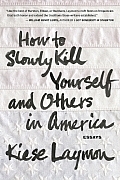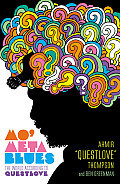One White Dude’s Privileged+Incomplete Take
 How to Slowly Kill Yourself and Others in America by Kiese Laymon
How to Slowly Kill Yourself and Others in America by Kiese Laymon
These books are not remotely tied together in any way other than the fact that they’re both written by great men who happen to be black. And maybe it’s simply that I read the Laymon the day before I read the ?uestlove, but it was hard not to hear the two oddly communicating with each other, or both, anyway, addressing a topic as foreign to me as Cyrillic or moon phases. The topic each addressed was something about the experience of young black men choosing their selves.
That may sound dumb. Maybe it’s dumb for me, a 34 year old very white man, to even try to wrestle with or address what these two men are doing in their books. The experience of reading How to Slowly Kill Yourself and Mo Meta Blues was, for me, most strange in illuminating the lack of something in my experience: I have never had to choose who I am, not really. I choose what I do, and how I earn resources, and how I spend resources, but Who I Am? I happen to, because of the accident of my skin color, not have to choose who I am—or, better, whoever I choose to be (beared lumberjack looking guy, bespectacled nerd, tank-topped weirdo looking dude) is basically safe.
Did you see this video? You should watch this video. I found it useful.
To be clear: that’s LeVar Burton—Jordi, and the guy lots of folks in my generation learned to associate with reading—talking about how he acts *when* he’s pulled over by law enforcement (notice he doesn’t say if). I myself have been pulled over in my 18 years of driving a total of I think 4 times, and at no point did I get a ticket, and in each of those instances it was because a light wasn’t working, and in each of those situations I was treated what I’d call normally—without suspicion, without malice.
But that’s what’s weird, to me, about being white and consuming any aspects of black culture in America: my normal is larded with privelige. It just is. I don’t know if it’s a causal privelige, or one predicated on someone else having a shit time (I don’t know if, all the times I should’ve been pulled over, some police officer was instead pulling over someone with darker skin than I). I truly don’t know. What I know is that I’ve loved the Roots since 1999—since I first heard “Adrenaline!”—and I’ve been reading Kiese Laymon since someone passed along a link to an essay of his on Gawker at some point in the last year or so (here’s something of his, recent, which is just devastating).
Laymon’s is a book about race, about being a young black man from Jackson, MS and the worlds of experience he’s moved through (in Jackson, and then at Oberlin, and now in NYC, though there’s less about that last one than the earlier locales, and the bulk of the earlier’s located in Jackson). What Laymon writes so gorgeously (that’s not fair: the writing, yes, is gorgeous [Laymon's writing's never less than fantastic, as impassioned and conflicted as the best of Baldwin], but it’s also…it’s hugely thick and complicated; not one sentence in How to Slowly Kill Yourself [or his novel Long Division, which is equally great and a rocket of narrative power] pretends at clarity or ease: everything is multivalent, and all aspects of [Laymon's, and, presumably, more] black life in the US—every move, every breath—carries deep and troubling history) about is his own Black Experience (one’s tempted on reading him to simply say he’s writing about *the* Black Experience, given the power of his voice, but of course there isn’t One), and how conflicted and tough that Experience is (I don’t know why I keep capitalizing it; read the book and you’ll feel compelled to do the same).
And I’d like to here posit that one of the reasons Black Experience (all of it) is tough in the US is not just because we white folks can be fearful pricks. Reading Laymon’s book reminds the reader (this reader, anyway) of something profound and uncomfortable: the greatest luxury of White Experience in the US, particularly middle-class white experience, is that we get to believe certain lies (such lies largely begin with bootstraps and move from there). Laymon’s How to Slowly Kill Yourself doesn’t merely call out those white lies (there’s an essay in which he imagines asking questions to Romney and Obama, and that comes close), but instead he tries to—through ‘straightforward’ essays like a three-part consideration of Michael Jackson, Bernie Mac, and Tupac, or a devastating piece on his uncle, to more complicated/exploratory essays which are multi-voiced, are letters to himself and others, etc.—expose and explore the complex/conflicted experience of one person’s experience of how it is/feels to be black in America, and trying to navigate the world as people claim it to be, and then the world as it actually is. Again: go watch LeVar up there, talking about how he acts when he’s stopped by cops. He had to make that choice because of some heavy-as-shit rules about Black Experience. Laymon, in his penultimate essay, goes guns-blazing meta, and offers a second-person essay detailing his experiences in publishing and considers the notion of “Real Black Writer” (imagine Franzen ever talking about being a Real White Writer), and the tricks and traps of that endeavor.
This is already too long. Look, if we were wise, as a country, Laymon’s book would be required reading everywhere.
And then there’s ?uestlove’s Mo’ Meta Blues. Please know that there’s little of overt race-stuff in ?uestlove’s book: it is emphatically a book for music fans, and for some of us the thing’s just gonna be treasure (for instance, those of us who disagree with ?uestlove’s footnoter’s [Richard Nichols, "the group's comanager since day one"] claim that nobody really gives a shit about the song “Double Trouble,” [some of us, Mr. Nichols, have never had an mp3 player that doesn't have that song loaded onto it]). What Mo’ Meta Blues is, more than anything, is the smartest and most interesting music auto/biography I’ve read maybe ever, and certainly the most important one having to do with popular hip-hop/black music of the last two decades (which is a silly difference to even acknowledge, given that pop music is now entirely built upon hip hop [the same as R+R was built on the blues]).
The reader can’t help but note the emphasis ?uestlove (given name: Ahmir Thompson) puts on being aware of how he and the Roots are coming across: as anybody who’s read his liner notes know, the man’s keenly self-aware, and has (usually) a very very deep and abiding interest in presenting himself and his band just so. The most intereting part of Mo’ Meta Blues isn’t about the early days of the Roots, or about Thompson’s youth in his domineering father’s band (his mom was in the band too, but Thompson the elder ran things), but about the late-90′s and early 2000s music scene—that post-Biggie/Tupac/De La Soul moment of neo soul and Jay-Z and then the rise of southern rap (OutKast+co) and then Kanye—and what’s weird and fascinating in reading ?uestlove’s take on the whole thing is to discover how much he wanted to be The Band, how badly he wanted the Roots to hit it and become this Big Thing—wanted them to be chart-toppers (a la OutKast or Kanye, whoever).
Of course, the reason that’s so fascinating to me is because the Roots have always been, to my friends and I, the band, the hip-hop outfit we automatically got the new albums of (…my friends and I all of course being nerdy college white people, which brings up this whole other unfigure-out-able thing re: audience that’s better to just note and pass by). When this book was released, the line I saw quoted most was the one about how ?uestlove’s parents wanted him to be someone who could be on Jeopardy!, not someone who would be an answer on Jeopardy!. Fair enough, certainly, but one wants to sort of nodge Thompson and be like: that time you wanted to blow Jimmy Iovine’s mind and get him to pull the trigger and get all huge with The Tipping Point? That music lasts, and now you’re here, and Kanye’s clock is running, and Big Boi and Andre aren’t doing much, and and and…
It’s a damn great book. The thing about the layout, too: Richard Nichols footnotes his way through the thing, quarreling with ?uestlove page by page, which is damn fun, and there are, interspersed, notes from one Ben to another (one Ben is ?uestlove’s co-author, one’s the book’s editor), sort of filling in background about the book. It’s amazing. There’s a legitimate claim to be made that hip-hop folks do the best autobios (this and Jay Z’s alone would augur for such a claim). Certainly it would be a better world with more and more of these. Come on, Tariq/Black Thought: we’d all love to read it.





